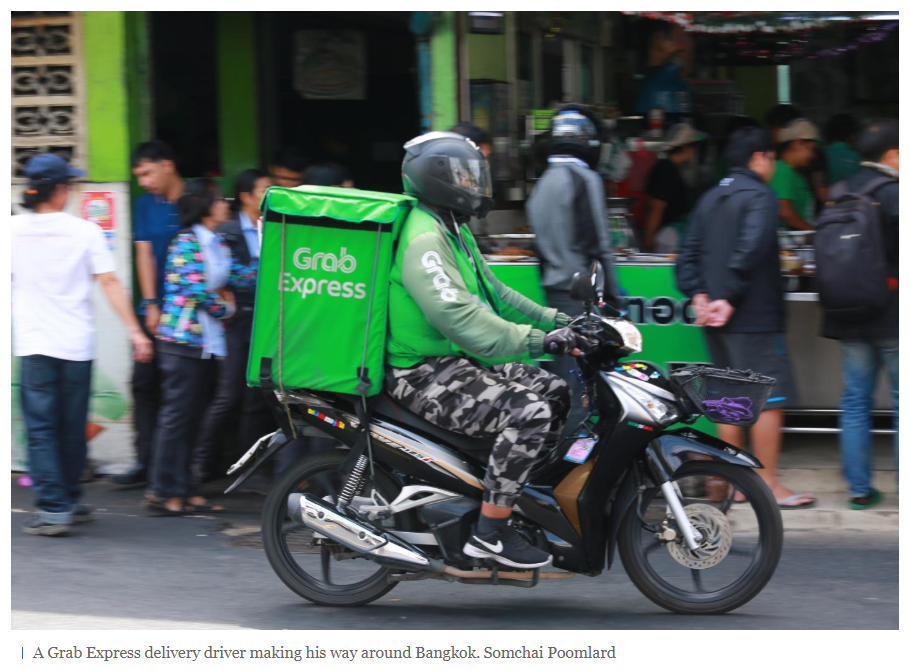Thailand: Price controls on delivery services may shackle riders
The government’s new move to apply price control measures to online food and parcel delivery services could heap pressure on operators already suffering from losses, while rider partners would be at risk of having their share of revenue diminished, say industry pundits.
On Tuesday, the cabinet resolved to include online food and parcel delivery services in the list of 51 controlled goods and services, based on the Price of Goods and Services Act. The issue was forwarded to the cabinet by the Commerce Ministry, citing the Central Committee on the Price of Goods and Services’s (CCP) consideration and notification.
Deputy government spokeswoman Rachada Dhnadirek said the measure was adopted because of numerous complaints about online services and online food delivery prices.
Pawoot Pongvitayapanu, former head of the Thai E-commerce Association, said online delivery operators face intense competition in the segment, with subsidies and marketing promotions rolled out to court customers.
“The price control is expected to put constraints on operators, who were already playing subsidy and marketing campaign games,” he said.
Paiboon Amonpinyokeat, managing partner at law firm P&P, regarded the price control for goods delivery for online business as “a good move”.
He said he is concerned about these delivery platforms’ business, which could take a toll on local rider partners in terms of revenue sharing, as these service providers still need to maintain their revenue performance.
Policymakers should look into exercising the Trade Competition Act as a way to regulate dominant players, Mr Paiboon said.
A source at an international legal firm who requested anonymity said policymakers need to take into consideration operators’ revenue, loss or profits, as well as their operation structures.
“E-commerce and food ordering platforms have faced losses and they just saw their transactions surge sharply in the wake of the pandemic,” the source said. “If policymakers apply strict measures on prices that see them continue to face losses, this might affect their service operations.”
Weeradej Panichwisai, a senior research manager at research firm IDC Thailand, said the price control could take a toll on rider partners, many of whom were laid off from previous jobs.
Riders also experienced dwindling revenue as the lockdown eased.
“In the future, if platforms seek revenue from extra service charges, how will the government deal with it?” he said.
With the control measure, platforms may choose to shut their offices in Thailand and run the service from other countries to avoid it, said Mr Weeradej.
Korkij Danchaivichit, chief executive of Thailand Post, said he agreed with the government’s measure as it is necessary for point-to-point services to have price controls. The country is gravitating towards a digital economy dictated by new norms after the pandemic, he said.
Governing delivery services is as crucial as other necessary goods and services, said Mr Korkij.
He said Thailand Post has never operated point-to-point delivery as this is a red ocean market.
The company handles parcel delivery and logistics based on a hub and spoke system, which means every delivery transaction must be sent via its centres or post offices before being sent to receivers.
As the control list comes into effect, the CCP, chaired by the commerce minister, has a slew of powers to take on, including determining the purchase price or the distribution price of the controlled goods and services.
This would deter distributors from setting a price higher than the determined price.
Based on Section 29 of the Price of Goods and Services Act, business operators are prohibited from unreasonably suppressing the price or inflating the price, or causing fluctuation of prices beyond criteria stipulated by the CCP.
Distributors who violate Section 29 could face a jail term of up to seven years or a fine not exceeding 140,000 baht, or both.
Online food and parcel delivery service transactions have surged after the government imposed a lockdown to contain the outbreak in March.
Kasikorn Research Center recently revised its food delivery market projection to growth of 19-21% from 35 billion baht last year. Previously the centre expected the market to grow by 17% this year.
Wattanasak Sur-Iam, deputy director-general of the Internal Trade Department, said once put on the price control list, operators have to notify the Internal Trade Department of their service rates and earn approval from the department before adjusting any service charges or prices. The department is issuing the guidelines and identifying penalties for offenders who refuse to comply with the committee’s decision.
Source: https://www.bangkokpost.com/business/1944328/price-controls-on-delivery-services-may-shackle-riders


 English
English




